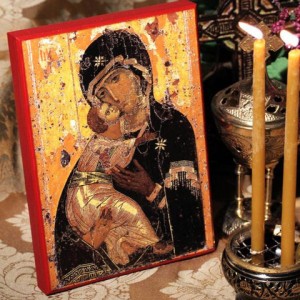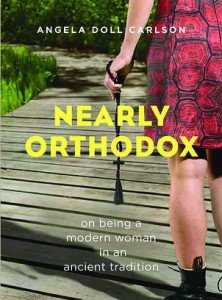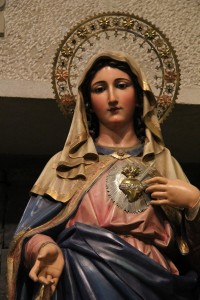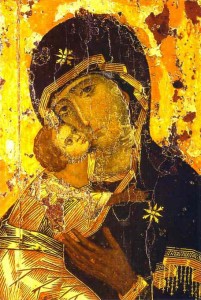By Angela Doll Carlson
Special Mothers Day excerpt from Nearly Orthodox
MY FAVORITE STATUE AT ST. TERESA OF Avila Church was that of Mary, the mother of Jesus. She was situated at the front, close to the altar, near the alcove on the left side of the church. I always thought that alcove was a sitting room, a waiting area, as there were pews there and statues and relics. I wanted to sit on those seats, light those candles, watch the Mass from that angle, in the company of Mary.
In later years that alcove would be where the musicians would reside during the Mass. Mary, Queen of the Universe, stood watch over the advent of the guitar Mass in the late seventies at St. Teresa of Avila. Before it moved to the alcove in the main church, the guitar Mass began in the basement of the church, in a sort of makeshift chapel with acoustic tile ceilings and shiny linoleum flooring. The space doubled as a fellowship hall, a housing for Vacation Bible School in the summer, and a gathering place for waiting wedding parties and mothers with crying children. It was cold in the basement church but my parents preferred it to the upstairs church on Sunday mornings. The thick, black perfect-bound hymnal was absent from the guitar Mass, and in its place was a pressboard book with photocopied song sheets, lyrics only, Mother Mary blue.
Mary was ever-virgin, always wearing blue, pristine robes, and to this day when I see that color I think, “Mother Mary blue.” She wore a crown of stars and at her feet was the whole earth- Queen of the Heaven, Queen of the May. I sang the “May Day” song all year round, though I was never the one chosen to crown her and she was unapproachable. She was set above us, too holy to touch, Queen of the May.
As much as I wanted to know her, I felt that we were not alike, the way I was not like the other girls in my class, not like the other women in my Protestant church communities, the other women in my grocery store line or college classes, or the other mothers at the park. Who is like me? The icon of the Theotokos of Vladimir would see me from her place on my altar day after day at home and at Vespers on Saturday, complaining about being unlike anyone, being left out and alone. I’d complain that all the other stay-at-home moms I know hold things together: they make the dentist appointments, they clean the kitchen counter, they put away the laundry. All the other stay-at-home moms take a shower in the morning, they put on clean clothes, they brush their teeth. All the other stay-at-home moms go to the gym, revel in their children’s scouting or sports or academic achievements. All the other stay-at-home moms are grateful they are at home; they want to be mothers, they want to be at home. We’re not alike.
Mary, Queen of the Universe, would stare down at me from her perch high above, near the alcove, next to the altar. Her hands were held out from her sides, showing her clean, white skin, perfect nails, fingers soft and unscathed. Mary, Queen of the Universe, was never my role model when I was young; I prayed instead the prayers of St. Jude, patron saint of hopeless cases. I did not want to be a mother; I wanted to be a writer, I wanted to be an actor, I wanted to be a warrior and a poet and a singer and a songwriter. I wanted to be a punk rocker, foulmouthed, notorious for sullen looks and moody lyrics. Mary, Queen of the Universe, had nothing to offer with her hands outstretched, so peaceful and serene, holding things together so perfectly, assumed bodily into heaven, intact, not left to decay here on Earth.
Surrounded by a deep gilded background, a sea of gold, the icon of the Theotokos of Vladimir often does not seem to see me there, standing near her during Vespers, in the quiet, in the dim light of Holy Trinity Orthodox Church. She looks beyond me, further ahead, past the place where I stand and into the pale future – hers, mine, ours. The cheek of the Christ child presses her face. He is in need. He is needy. His arm is wrapped around her neck, pulling her to him. “Look here,” he says. I know those words; I know that hand on my neck, that cheek against my own.
When I make eye contact with her now that I, too, am a mother, I see something new in this woman. No longer Queen of the Universe and untouchable, I see her now, weary and fully woman – body aching, bone tired; even the Son of God has a child’s needs and wants. Even the bearer of God’s Son has a mother’s needs and wants. She wants him to be healthy. She wants him to be happy. She wants him to get married, grow old and wise. Somehow in her heart she knows this will not happen. Somehow in her heart she knows that her fears for his future are both commonplace and cosmic.
 When I go to her now, when I light the candle nearest her on my own icon stand at home and kiss her icon tenderly every morning, I am thinking about my children and about my fears – for them, for me, for us all. When I go to her now in the early morning hours, she sees me and we know each other. She gives me the “it’s going to be all right” look I find myself giving to the harried mother in line at the grocery store, with children climbing on her back and her shopping cart, clinging and pressing their faces into her cheek. “Look, here. See me,” they say. When I go to her now and kiss her icon tenderly every morning, I am thinking of that harried mother in line at the grocery store, and I am thinking of the woman who has never been that harried mother in the grocery store but always yearned to be, and I am thinking of the woman who has no need or desire to be that harried mother in the grocery store line, and I feel all of them in my skin, in my lips as I kiss the icon. We are, all of us, in this together, and Theotokos, God-bearer, touches my face and tells me in no uncertain terms that we are alike. We are all alike.
When I go to her now, when I light the candle nearest her on my own icon stand at home and kiss her icon tenderly every morning, I am thinking about my children and about my fears – for them, for me, for us all. When I go to her now in the early morning hours, she sees me and we know each other. She gives me the “it’s going to be all right” look I find myself giving to the harried mother in line at the grocery store, with children climbing on her back and her shopping cart, clinging and pressing their faces into her cheek. “Look, here. See me,” they say. When I go to her now and kiss her icon tenderly every morning, I am thinking of that harried mother in line at the grocery store, and I am thinking of the woman who has never been that harried mother in the grocery store but always yearned to be, and I am thinking of the woman who has no need or desire to be that harried mother in the grocery store line, and I feel all of them in my skin, in my lips as I kiss the icon. We are, all of us, in this together, and Theotokos, God-bearer, touches my face and tells me in no uncertain terms that we are alike. We are all alike.
 MY INNER PUNK ROCKER IS A FRAUD. MY inner punk rocker puts on a brave face, frozen sneer and eyebrow arched, but she is afraid too, afraid of being shunned, rejected, left out. She is willing to stare the lion down, not because she thinks she’ll survive, but because she has no other choice, backed into the corner of the cage she built for herself. My inner punk rocker has kept me alive and protected even as she tips her hand time after time. She bristled at the suggestion that Orthodox women cannot accept communion when they are bleeding, the suggestion that a woman is unworthy, unclean, unwelcome merely based upon her God-made biology. So I calmed her down and dug for the reason behind the doctrine.
MY INNER PUNK ROCKER IS A FRAUD. MY inner punk rocker puts on a brave face, frozen sneer and eyebrow arched, but she is afraid too, afraid of being shunned, rejected, left out. She is willing to stare the lion down, not because she thinks she’ll survive, but because she has no other choice, backed into the corner of the cage she built for herself. My inner punk rocker has kept me alive and protected even as she tips her hand time after time. She bristled at the suggestion that Orthodox women cannot accept communion when they are bleeding, the suggestion that a woman is unworthy, unclean, unwelcome merely based upon her God-made biology. So I calmed her down and dug for the reason behind the doctrine.
The roots of the practice begin long before the birth of Christ. It is Old Testament, it is Israelites wandering in the desert. The Hebrew word is tuma. English could not find a word for it, and so the word “unclean” became attached, but the essence of tuma is not dirt, shame, or filth. The essence of tuma is loss.
The Hebrews understood the body, the life, the essence of things in terms of loss and grief far better than most, and so tuma was the body of one who has died but also the body of the woman who has given birth. Where life had been, the essence of God resided; the space is holy ground, even after the life is gone.
The body of one who has died has seen the essence of life escape it. The Holy exits this vessel. This is the loss. The body of a woman who has given birth has seen the essence of life multiplied, grown, and departed from her. The Holy leaves a space in her not yet refilled. The woman who moves through the cycle of fertility, the possibility of new life creation that is unrealized, suffers that same loss. The potential of life is there; when that passes, this is the loss. For a time, she is repaired, she is renewed, she is filled again. She is too holy to touch because she is under reconstruction, readying for the potential of holy creation in herself once again.
In the Garden, I imagine the man lying there on the sand, staring at this new creature who is like him, who is nothing like him, this mysterious thing. Adam had no way to know that men would always find women as mysterious and magical as he found Eve. She, being creator as well, could make people of his modest offering. She, being mystical, was curious enough to ask about the forbidden fruit. She, being woman, was able to participate at a biological level in bringing God into flesh, the Word whispered into her body just like that first day of the world, the Word whispered into the darkness of her quiet womb; too holy to touch until that very moment, too holy to touch while she carried the Word, too holy to touch after He breathed the air outside her body for the first time. So then, Theotokos – Godbearer, Word-bringer, ordinary woman – she is all of us, speaks for all of us who are bleeding, all of us who have bled and waited and labored and grieved.
She knows, as my inner punk rocker knows, that I am always bleeding, I may always be bleeding in one way or another. She knows I am the woman on the road, reaching desperately for the robe of Christ. I can see Him turn at that touch, as if the healing energy began to unweave from his DNA, from His skin, from His robe the moment the thought came into my head and out from my lips, my arm outstretched: “I’m tired of bleeding.” The healing was ready, I was ready, He was ready; too holy to touch. He found me there, along the road, and the road found me bleeding, and the road found me healing.
Angela Doll Carlson is a poet, essayist, and author of Nearly Orthodox: On Being A Modern Woman in an Ancient Tradition (2014 © Ancient Faith Publishing). This article is an excerpt from Nearly Orthodox and is reprinted here by permission. Please be sure to check out her blog at mrsmetaphor.com and you can purchase her book HERE.


